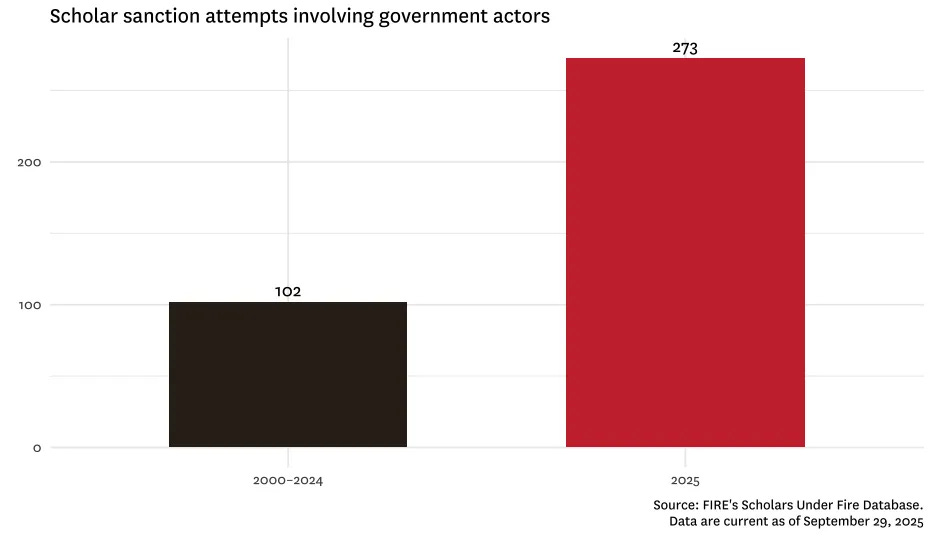FIREwire — October 3, 2025
Trump targets 'domestic terrorism,' foreign films, and YouTube settles
“Each day, I recognize (to paraphrase Lincoln again) that the brave men and women, living and dead, who have struggled in our Nation’s service have hallowed our Constitutional freedom far above my (or anyone’s) poor power to add or detract. The only Constitutional rights upon which we can depend are those we extend to the weakest and most reviled among us.”
— Judge William G. Young to an anonymous note he included at the top of his ruling that the Trump administration chilled the speech of professors and students.
Trump’s ‘domestic terrorism’ memo targets people by ideology
The memo expands what counts as “domestic terrorism” to include ideologies like anti-capitalism or anti-Americanism.
Adam Goldstein, vice president of Strategic Initiatives at FIRE, explains:
A missive from the most powerful man in the world carries so much force that it is, inevitably, a blunt instrument. When the president uses his pen to take aim at anything, it will cause a chilling effect.
White House pressures colleges with funding deal
The Trump administration is asking colleges to sign a wide-ranging agreement that could give them advantages in federal funding, but critics warn the move risks leveraging money to impose political priorities on higher education.
As FIRE said:
Freedom thrives when the people, not bureaucrats, decide which ideas are worthy of discussion, debate, or support. . . . A government that can reward colleges and universities for speech it favors today can punish them for speech it dislikes tomorrow. That’s not reform. That’s government-funded orthodoxy.
California considers fining platforms that allow ‘hate speech’
A California bill on Gov. Gavin Newsom’s desk would punish social media platforms for showing or recommending “hate speech,” which is not illegal in this country, with fines of up to $1 million.
FIRE’s stance on this is simple: “SB 771 threatens online free expression and Gov. Newsom should veto it.”
YouTube settles with Trump
YouTube agreed to pay $24.5 million to settle with Trump over his removal from the platform after Jan. 6, becoming the last of the three major platforms to do so, along with Meta and X.
In February, FIRE Legal Director Will Creeley commented on Meta’s settlement:
Private social media companies have their own First Amendment right to run their platforms as they see fit. They are not government actors, as the district court dismissing the cases against social media companies easily concluded. Nevertheless, the company agreed this week to pay $25 million to end the appeal. Meta CEO Mark Zuckerberg, who attended the president’s inauguration, appears to have concluded that settling the suit was a small price to pay for political favor and access.
Trump announces 100% tariff on foreign films
Trump said in a Truth Social post this week that he intends to impose a 100% tariff “on any and all movies that are made outside of the United States.”
As Tyler MacQueen writes:
The president’s vague, broad call for speech-retaliatory tariffs against foreign films has the potential to silence storytellers, chill the efforts of studios, and prevent American audiences from participating in the international exchange of ideas movies provide. That doesn’t “Make Hollywood Great Again.” It makes it worse.
Also in the news
Federal indictment charges three activists with alleged “doxing” of ICE agent in Los Angeles.
Jane Fonda revives the Cold War-era Committee for the First Amendment, her father’s 1947 free speech defense group, now backed by over 550 figures in entertainment and media.
This week’s datapoint
Forty-seven. That’s how many entries we added to our Scholars Under Fire database in the past week, upping this year’s already record total to 356. And government officials have already been tied to 273 of those attempts.






"A California bill on Gov. Gavin Newsom’s desk would punish social media platforms for showing or recommending “hate speech,” which is not illegal in this country, with fines of up to $1 million."
Is there a possible silver lining in this as it would require hate speech to be defined which could then be challenged against existing speech protections? I may be being too simple here as I'm basically saying "yeah, but if they arrest you you'd get the chance to prove your innocence."
So after shrieking about Jimmy Kimmel, nothing about the conservative journalist arrested by Portland Police? Typical of FIRE and its left-wing bias.